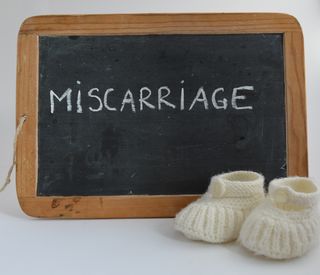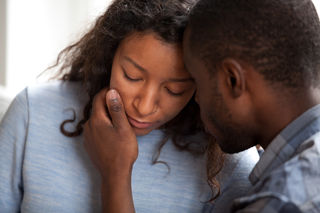Miscarriage
Miscarriage: The Unspoken Loss
Despite how common miscarriage is, women often experience the loss in silence.
Posted July 8, 2019
Today, I self-disclosed to my mentee that I’ve had a miscarriage.* Until now, no one outside of my family knew about my miscarriage. The only physical proof that I miscarried, besides my electronic medical record, is the rose plant my husband and I planted in our baby’s honor.
But today when I asked my pregnant student how she was feeling in her first trimester, she shared that she too had miscarried. I felt the emotions rise inside of me, burning up from my stomach and into my chest. My body was hot, and my eyes were teary.
With trepidation, I deliberated if this was a moment to open up and be personal or respond with a distanced empathy. Over the phone, in the seconds I had before silence becomes awkward, I questioned myself about what would be helpful and appropriate to say to her. I ultimately decided to take the risk and share that I also had lost a pregnancy.

Why? What was my intention? What did I hope to accomplish? I hoped to provide her comfort and communicate that she was not alone. I wanted to give a voice and one more face to the statistic that for women in their childbearing years, the chances of having a miscarriage can range from 10-25 percent. One of my doctors told me that 1 in 4 recognized pregnancies end in miscarriages.
While these statistics are communicated, there is a lack of discourse about these numbers outside of the doctor’s office. Where are the narratives of the women who both suffer and survive? Where are the perspectives and advocacy of psychologists who help with other losses in life? Loss and grief of loved ones, loss of a marriage, pets, and jobs seem to receive recognition, but this ceases to be the case with pregnancies that end involuntarily and prematurely. And so with my self-disclosure, I wanted to lean into changing the silence around miscarriage, through one conversation at a time.
I believe the invisibility and lack of open discussion about miscarriage is another way many women can be unfairly alone, muted, burdened, and stigmatized with an experience that is not their fault. Unfortunately, we see this in many areas in women’s lives, including abuse, sexual assault, disabilities, mental health issues, and more.

It also is bewildering to me that this lack of social discourse continues to occur when the prevalence of miscarriage is so high. While miscarriage very common, the discussion around is typically absent or constricted to hushed conversations. On the other hand, people rarely know what to say when loss or grief is extremely visible.
Think about the last funeral you attended. Did you look forward to speaking to the family who lost their loved one? Or did you struggle to find the right words? So perhaps it is naïve to expect that discussing this aspect of a woman’s loss would be any different or even easier.
The silence and fear of sharing were so strong for me that it took five years and two children later for me to be able to say the words to another woman, “I also have had a miscarriage.” Five years of thinking about it in silence, crying at movies where women lose their babies and exchanging knowing glances with my husband at times we remember what happened the first time I was pregnant.
I am very blessed with two beautiful sons. I love my three-year-old who wears a superhero cape, his fireman helmet, and astronaut gloves all at the same time, tying ropes with conviction around my kitchen cabinets in order to make a rocket ship that will fly him to the moon. I love my 11-month-old who sings himself to sleep, munches loudly when he eats solids with his two teeth and is able to tackle his older brother even before he walks. And I love my baby that never formed enough to join us on this earth, who I remember when I water my rose plant in our backyard, and I will always cherish in my heart.

Psychological Tips:
My experience is just that, my experience. Below I’d like to share some tips for coping with a miscarriage that are grounded in my knowledge from my work as a counseling psychologist.
- Common feelings associated with miscarriages include self-blame, guilt, fear, fear about one’s physical safety, fear about not being able to have additional children, anger, shame, disbelief, sadness, anxiety, confusion, and even relief. However, any feeling is a “normal” reaction, because there is no one right way to respond to a miscarriage.
- Personalizing your ritual to fit your beliefs, values, and culture will likely increase the positive impact it may have for you. Writing and reading a poem, listening to a song, painting a picture, saying a prayer, or planting a flower are examples of rituals.
- You have strengths. Think about ways you have gone through difficult things in the past and see if these strengths and positive coping strategies work for this time in your life too.
- Identifying someone you trust to open up to about your miscarriage/s may be helpful. Initiating such discussions can be difficult. Sometimes it can be helpful to let the person know even before the conversation begins what you are looking for from them. For example, maybe you just want them to listen or to keep you company while you are trying to sort through your feelings.
- There is no correct timeline for how long you are allowed to think about or have feelings about your miscarriage/s. Take all the time you need and likely your thoughts and feelings will change over time.
The five points above are not exhaustive, but I do hope they will be helpful to you.
* I wrote this post four years ago and believe now is the right time to share it publicly. I hope my narrative and tips will be a helpful resource.

Additional resources:




